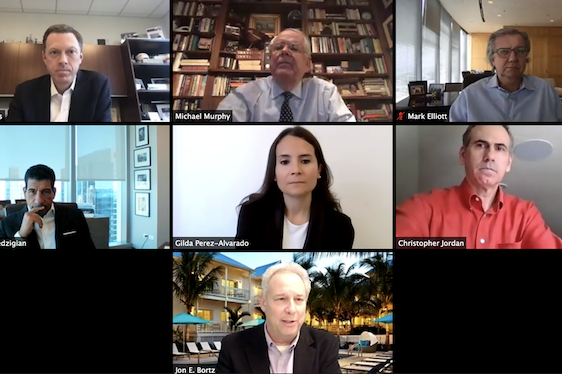Glimmers of life in the U.S. economy, the group market and global travel triggered a bit of optimism among lodging executives on a virtual NYU International Hospitality Industry Investment Conference panel on Wednesday.
While he thinks 2021 will get off to a slow start, “the second half will accelerate faster than we think,” predicted Hodges Ward Elliott President Mark Elliott. Joining him on the “Financially Speaking: IREFAC Insiders” panel were Kevin Jacobs, CFO and president, global development, at Hilton; Christopher Jordan, executive VP, Wells Fargo; Michael Medzigian, chairman and CEO, Watermark Lodging Trust; and Gilda Perez-Alvardo, CEO, Americas, JLL Hotels & Hospitality. (The panel was moderated by Jon Bortz, chairman and CEO, Pebblebrook Hotel Trust, and Michael Murphy, head of lodging and leisure capital, First Fidelity Cos.)
“I think you’ll see a surprisingly positive 2022,” Elliott said, basing his opinion on several factors: a healthy economy, pent-up travel demand and owners who report their long-term group bookings are picking up. He and other panelists also cited Pfizer’s hopeful news of a possible vaccine for COVID-19 as a good omen.

A return to normal, panelists predicted, isn’t likely for another several years. Judging from past pandemics and crises, Jacobs said, getting there means “you have to have people confident they can travel again, and then build back. It’s not like you just flip a switch and hotels will be filled with big groups again.”
Jordan suggested that corporate travel won’t rebound until companies recall remote employees into office settings. “Companies are slow-walking a return to the office,” he said. “And no one wants to be a first mover. That piece is a bit of a wild card for next year.”
“Our people are back in full force in China” and starting to travel in other parts of the world, Perez-Alvarado said. She thinks corporate travel over the next few years will be more strategic.
With the extreme travel downturn, hotel companies have resorted to survival tactics that are likely to persist even after any recovery.
Medzigian, who said Watermark lost most of its revenue almost overnight last spring, said early on the company was burning through U.S.$50 million a month and forced to shut down 17 hotels (all but one have reopened). The crisis resulted in staff cutbacks, but those furloughs provided a lesson, showing that “what we thought was a skeleton staff is no longer the case — you can operate hotels with very few people.”
He said he hopes lessons like this will stick as business picks up. “Our asset managers got pretty good at this new normal, and now we know how to operate in this environment.”
The pandemic hasn’t made a huge dent in development, Jacobs observed. He said Hilton’s third-quarter signings were off about 20% from 2019, but “people are still signing deals and putting shovels in the ground.”
Financing for those deals is another matter. While lenders are actively working with owners to get through the crisis, the future is not so sunny. Jordan said he expected construction financing to be constrained for a few years, and lenders will step up loan standards.
“From what we can detect, many banks are trying to actively reduce their exposure to the industry, particularly at the property level,” Jordan said. But “even this will fade,” he added. “Competition tends to erode discipline.”
Meanwhile, buyers have been actively sniffing around, Elliott said. “We’ve seen 18 to 20 bids on hotels that would have seen eight to 10 before COVID.” Not all of them are bargain hunters, he added.
“We’re in a very low-yielding environment, so there is a wave of capital looking to enter the space,” Perez-Alvardo said. And there are plenty of owners motivated to sell, she added — not because of the pandemic, but for other strategic reasons.
